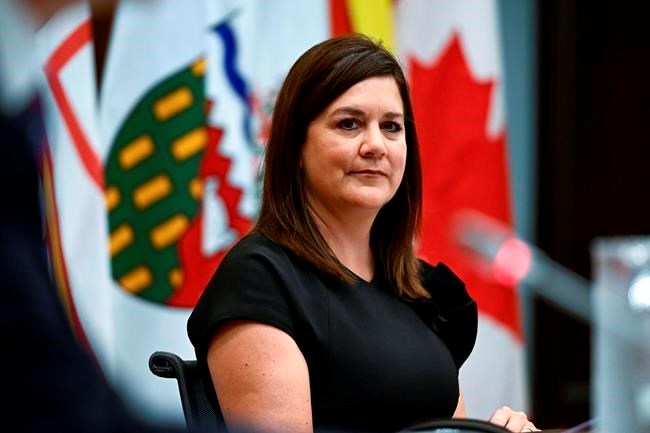OTTAWA — Incoming Supreme Court of Canada judge Michelle O'Bonsawin, poised to become the first Indigenous member of that bench, says she's a "tell it like it is person" and a lifelong student.
In O'Bonsawin's first public appearance since Prime Minister Justin Trudeau nominated her for the position last week, she said she believes her life experience as an Indigenous person, a Franco-Ontarian and someone who grew up in rural northern Ontario will serve her well on the court.
She comes to the position from the Ontario Superior Court of Justice in Ottawa, where she spent five years as a judge. Before that, she was general counsel for the Royal Ottawa Health Group.
Born in the small northern Ontario town of Hanmer, O'Bonsawin is a fluently bilingual Franco-Ontarian and an Abenaki member of the Odanak First Nation.
O'Bonsawin came across as down-to-earth, even self-deprecating, saying she felt like her journey was a "long shot" and her résumé is "oddball" compared to other Supreme Court appointees, but that she has worked hard to get to where she is today. In her opening remarks, she named mentors who helped her along the way, saying she has "stood on the shoulders of giants."
She said she wanted to be a lawyer since she was a kid and hopes her story will prove inspiring to young people, especially young Indigenous women. "Anything is possible if you set your mind to it and you surround yourself with great people."
When she filled in an application to become a Supreme Court justice, O'Bonsawin said, "I must have read my submission email about 10 times before I pressed that send button." She was "overjoyed" when she got an interview. "At that moment, I became that nine-year-old girl again."
She added "fun facts" about herself at the end of her opening remarks, including that she enjoys painting in her free time — a hobby she picked up with her dad when she was a teenager. Her husband is an engineer and lawyer, she said. They have two sons, five dogs, eight chickens and a gecko. And: "I have nothing against cats."
As a 48-year-old, she could potentially be on the court for a very long time, until the mandatory retirement age of 75. She joked that she's in it "for the long haul," and "I definitely want to get along and play well with others."
Wednesday's hearing was an opportunity for parliamentarians to get to know the incoming justice better, but unlike the process in the United States, a vote by elected officials is not required to cement her appointment, and political controversy is rare. Representatives of all parties congratulated her on the appointment.
While O'Bonsawin was unable to discuss matters that could come before the court, she spoke about her experiences in labour and mental health law and her research into the application of Gladue principles, which require judges to consider the backgrounds of Indigenous people in the criminal justice system.
She shared an anecdote about how her own Indigenous identity was brought up in the courtroom.
It was 2018, the day after President Donald Trump had called United States Senator Elizabeth Warren "Pocahontas" for claiming she had Indigenous American heritage.
While she was sitting as a judge, she overheard a lawyer telling a younger associate that she was the "Pocahontas of the North."
She decided to put the comment on the record and told her sons about it when she got home. "We all face issues and what's important is how you deal with it. You have to speak out when that happens," she said. "We have to respond and we have to be vocal and tell them that it's not right, because otherwise it just continues."
O'Bonsawin obtained a master's degree in law from Osgoode Hall while working at the Royal Ottawa, and she finished a doctorate in law from the University of Ottawa while hearing cases full-time at the Ontario Superior Court.
O'Bonsawin said that "education is key" when it comes to training judges to better understand the experiences of Indigenous people when they are moving through the criminal justice system.
She said she would bring her Indigenous traditions and heritage to the table, and an awareness of the effect of residential schools and the calls to action of the Truth and Reconciliation Commission, when discussing issues with the other justices on the Supreme Court.
Justice Minister David Lametti had appeared before a House of Commons committee earlier on Wednesday, calling O'Bonsawin's nomination a historic moment for Indigenous people and all Canadians.
"It is extremely important that Indigenous Peoples be able to see themselves in what are quite frankly colonial institutions," Lametti told the committee. "And see their participation as a way of making those institutions better, and see this as a way of making Canadian law better."
The requirement for English-French bilingualism has often been cited as a barrier for Indigenous candidates seeking a position on the country's highest bench, but Lametti pushed back on the notion in his remarks to MPs.
"Let there be no doubt that there are qualified Indigenous candidates who speak both official languages," he said. "It is an apex court, the top court in Canada. You have a whole career to prepare for it. So bilingualism, as a criterion for that court, I firmly believe shouldn't stand in the way of good Indigenous and non-Indigenous candidates."
O'Bonsawin was asked about how Indigenous language can be better incorporated into the judicial process but did not comment on the issue beyond saying she is working on her own Abenaki language skills and believes accurate translation services must be provided in courts for people who speak Indigenous languages.
O'Bonsawin will fill the vacancy left by Justice Michael Moldaver, who is set to retire Sept. 1 and whose contributions Lametti called "monumental."
This report by The Canadian Press was first published Aug. 24, 2022.
Marie-Danielle Smith, The Canadian Press


.png;w=120;h=80;mode=crop)

